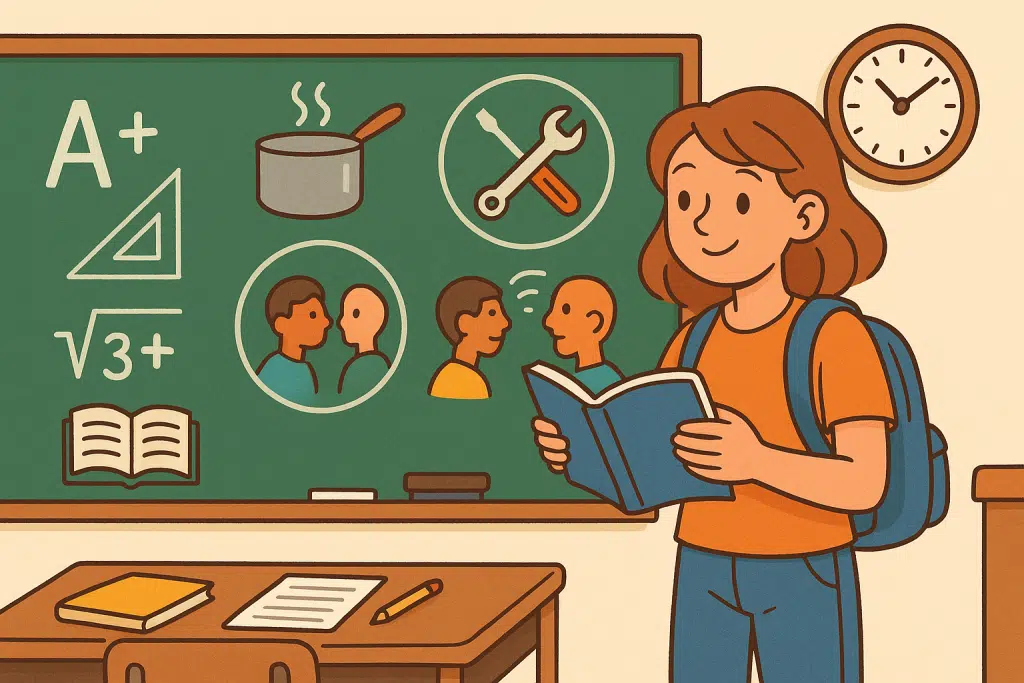Why Education Should Focus More on Life Skills
Isabella Lewis August 12, 2025
Let’s be honest—most schools pump out straight‑A students who can ace exams but can’t do laundry, cook a meal, or even file taxes without a meltdown. That’s why why education should focus more on life skills isn’t just a catchy phrase—it’s a survival strategy. If education doesn’t evolve, it’ll keep sending students into adulthood emotionally stunted and totally unprepared. Cue the existential dread.

The Trend That’s All Over the Feed: “Adulting 101” & Beyond
Here’s what’s hot right now: Gen Z is packing “Adulting 101” courses like they’re the next big TikTok challenge—it’s practical, not viral dances. These lessons—on laundry, basic car maintenance, floating through rent negotiations—are trending because too many graduates just…aren’t ready.
A recent K12 survey found that nearly one in three high-school grads don’t feel ready for real life, especially when it comes to handling finances and emotional independence. Classic case of the “why didn’t they teach that in school?” vibes.
Life Skills vs. The Classic Curriculum—It’s About Keeping It 100
Our conventional education system is math-heavy, test-heavy, and life‑skills‑light. But look—a 2025 research study shows that upper-secondary life skills education helps students actually tackle real-life challenges, especially in complex subjects like social science or English.
Coupled with findings from Panorama Education: teaching life skills isn’t fluff—it’s linked to better academic outcomes, health, and economic success. Make it more than Pinterest inspo—you teach a student how to manage stress, they’ll do better in school and life.
Real-World Moves: Cities and Countries Are Finally Noticing
- In Mumbai, they launched InclusivEd, the first university‑certified life and career skills program for neurodivergent adults. It’s modular, flexible, includes real‑world internships—actual empowerment, not pity.
- Over in Karnataka, India, parents are signing kids up for cooking, public speaking, nature trails—skills that actually help kids connect with the world, not just memorize equations.
- And guess what? NYC high schoolers themselves are calling for modernized home economics, saying that since the 1960s, schools have stopped teaching things like cooking or laundry—and they’re tired of flying into adulthood clueless.
SEL, Civics & Social Smarts—Essential, Not Optional
Let’s zoom out a bit. Social‑emotional learning (SEL) teaches empathy, managing feelings, relationships—it’s not just soft stuff. Programs including SEL show 11 percentile improvements in academic performance, and lower aggression and bullying.
Meanwhile, civics education—teaching ethical reasoning, critical thinking, community participation—is being dubbed the next STEM. Only 22% of 8th-graders are proficient in civics, and 82% of managers say Gen Z lacks these soft skills. If schools don’t fix that, we’re raising a generation comfortable staring at screens—not engaging with society.
Step-by-Step Guide: How Education Can Actually Push Life Skills
Let’s break it down so even the most curriculum-averse educator or student can follow:
Start with tiny, real modules
Just 20-minute “Adulting micro‑lessons” peppered through the day—think “budget basics,” “stress‑coping hacks,” or “laundry hack.”
Drop them into transition periods or when students need a brain break. Rotate through practical stuff like “reading lease agreements,” “basic car red flags,” or “networking without being weird.” Each lesson = one skill they can use immediately.
Bite-sized is digestible and won’t get overshadowed by calculus. Students actually absorb this stuff when it’s not competing with their “real” subjects for time.
Embed into other subjects
History class? Teach civic engagement beyond memorizing dates—have students research local ballot measures or analyze how voting patterns affect current policy.
English? Throw in a “how to negotiate, not ghost” speech lesson. Practice job interviews, professional emails, or giving feedback without burning bridges.
Math gets real with compound interest on student loans, tip calculations, or mortgage rates. Science can cover nutrition literacy, household environmental choices, or understanding medical basics.
Works better than standalone “life skills 101” that learners skip. When practical lessons emerge from academic content, they feel essential, not extra.
Get parents and community involved
Bring in local chefs, plumbers, counselors for 15-minute mini masterclasses. Restaurant manager teaches food safety, tax preparer explains filing basics, bank manager shows how to spot predatory lending.
Keep sessions brief, practical, and tied to real student concerns. Create a “Community Mentor Network”—locals commit to one short session per semester.
Real people sharing real tips = more memorable than textbooks. Students remember the plumber’s “never flush this” warning or the counselor’s actual stress hacks way better than chapter 12.
Flip the script with SEL integration
Add questions like “How would a civil rights advocate handle this workplace discrimination?” to history projects. In literature, explore “How could this character have communicated better?” or “What coping strategies might have prevented this mess?”
Science classes can tackle decision-making frameworks around research ethics or health choices. Math word problems can include budgeting for mental health resources or calculating work-life balance costs.
Build compassion, response management—and suddenly you’re teaching life skills and empathy without changing the syllabus. Students develop the soft skills employers actually want: communication, teamwork, problem-solving.
Set metrics that matter
Survey students on “management confidence” before/after: “How confident about managing monthly budgets?” “Ready to handle workplace conflict?” “Know how to find mental health resources?”
Track practical stuff beyond test scores. Are students asking better adulting questions? Seeking resources independently? Problem-solving without panic attacks?
Less about test scores, more about “I can do this without panicking.” Success = students who can research apartments calmly, understand workplace rights, or seek help without shame. Consider portfolio assessments where they document growing life skills through reflection or peer teaching.
Why This Matters (And How It Changes the Game)
- Mental health boost: Current teens rate stress at 5.8/10, way higher than healthy adult levels of 3.9. Teaching them self-awareness and coping can shift that.
- Academic payoff: SEL alone can bump performance significantly. Combine with real-world skills? You get students who think better and live better.
- Employability: Employers want resilience, communication, problem-solving—not just grades. Starting that in school gives graduates more than a slip of paper.
Wrap-up: Let’s Get Real—Literally
Schools need to stop acting like life stops at graduation. The world’s changed: rent’s up, adulting’s hard, and nobody’s teaching how to do it. This isn’t lofty—it’s urgent. Because students deserve more than test prep—they deserve preparation for life. And the proof’s out there: cities, parents, students themselves are saying it loud. So let’s listen.
References
World Economic Forum. (2020). Schools of the Future: Defining New Models of Education for the Fourth Industrial Revolution. Retrieved from https://www.weforum.org/reports/schools-of-the-future
OECD. (2021). Beyond Academic Learning: First Results from the Survey of Social and Emotional Skills. Retrieved from https://www.oecd.org/education/beyond-academic-learning-92a11084-en.htm
UNICEF. (2019). Global Framework on Transferable Skills. Retrieved from https://www.unicef.org/education/skills







